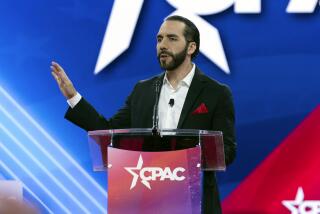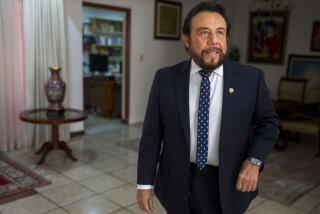Ortega Offers to Work With U.S., Pledges Fair Vote in Nicaragua
- Share via
MANAGUA, Nicaragua — President Daniel Ortega, marking the 10th anniversary of Sandinista rule in a conciliatory mood, offered Wednesday to work with the United States “for the stabilization of Central America” and to make Nicaragua’s coming election campaign a “serious and responsible clash of ideas” with his opponents.
“We have a crisis provoked by the United States in Nicaragua, in El Salvador, in Panama. Where is this going to stop?” he asked. “We are ready to work with the United States on negotiated solutions to all these problems, but first we have to sit down and talk.”
Standing before nearly 100,000 supporters in Managua’s lake-front Carlos Fonseca Park, the 43-year-old president spoke as the leader of a revolution supremely confident of its staying power. Seated behind him on a hillside dais were the eight other comandantes who have led the Sandinista National Liberation Front as a collegiate body since 1979.
The Sandinistas marched into Managua a decade ago to end 43 years of Somoza family rule. They survived 6 1/2 years of war by U.S.-backed Contras against their socialist program, but the economy is a wreck, the rebel army is intact in Honduras and Washington maintains a commercial embargo.
No foreign head of state or government attended the anniversary rally, a measure of the Sandinistas’ relative isolation. North Korean Vice President Li Jong Ok was the highest-ranking visitor.
Much of Ortega’s hourlong speech centered on his eagerness to come to terms with the United States, which broke off negotiations with Managua in 1985. “The United States is not going to be hurt by talking to us,” he said. “It would be exalted by such a gesture.”
The Bush Administration, casting doubt on the prospect of fair elections here, has thwarted a Feb. 14 accord signed by Ortega and four other Central American presidents to start a phased disarmament of the Contras. Ortega disclosed Wednesday that his government is holding talks with Honduras to end the deadlock before the region’s presidents meet again Aug. 5.
Several times in his speech, Ortega insisted that the Sandinistas practice “authentic and total democracy” and that the United States has no right to judge otherwise.
“Here all political forces can express themselves freely,” he declared. “The revolution has no fear of ideological struggle because the revolution possesses the truth. . . . The revolution is irreversible.”
In a striking departure from virulent Sandinista rhetoric, Ortega said it is time to recognize the “patriotic participation” of some Nicaraguans in the early days of the revolution before they joined the opposition. He named opposition publisher Violeta Barrios de Chamorro, one-time Contra leader Alfonso Robelo and former Managua Mayor Moises Hassan.
“They did not betray us,” Ortega said. “They had their ideology and could not make the leap (to ours). Now we are in different camps.
“As president of all Nicaraguans,” he added, “I urge all political groups and communications media to act with serenity . . . so that the campaign is conducted as a serious and responsible clash of ideas. Otherwise, we will have a polarized situation that could escape control.”
Opposition Candidate
Barrios is a candidate for nomination by a 14-party opposition bloc to run against Ortega in the presidential election next Feb. 25. Her newspaper, La Prensa, is waging a battle with Sandinista media.
The president asserted that the Sandinistas will win because of their revolution’s achievements--a halving of the infant mortality rate, land titles to 125,000 peasant families and 1,735 new schools, among others--and because Nicaragua’s current poverty is better distributed than the greater abundance of the Somoza years.
Sandinista militants worked hard to get Managuans to the rally to show their electoral strength. Enrique Murillo, an 18-year-old army veteran who lost his right arm in the Contra war, arrived on foot from his farm 15 miles away to fulfill what he called “my duty to militarism.”
Carlos Salazar, an older man, was walking the other way. “Everybody with a government job has to go to the plaza, but I don’t have one,” he said. “I’m better off today looking for work.”
More to Read
Sign up for Essential California
The most important California stories and recommendations in your inbox every morning.
You may occasionally receive promotional content from the Los Angeles Times.













